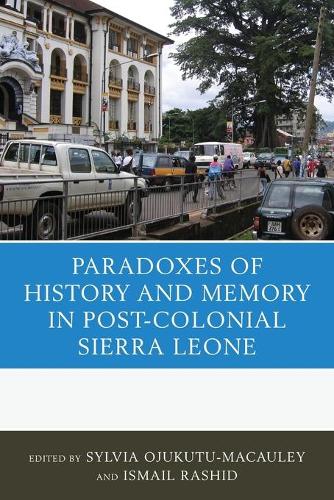
The Paradoxes of History and Memory in Post-Colonial Sierra Leone
(Paperback)
Publishing Details
The Paradoxes of History and Memory in Post-Colonial Sierra Leone
By (Author) Sylvia Ojukutu-Macauley
Edited by Ismail Rashid
Contributions by Arthur Abraham
Contributions by Ibrahim Abdullah
Contributions by Lansana Gberie
Contributions by Tamba M'bayo
Contributions by Gibril Cole
Contributions by Nemata Blyden
Contributions by Festus Cole
Contributions by Yusuf Bangura
Bloomsbury Publishing PLC
Lexington Books
9th June 2015
United States
Classifications
Tertiary Education
Non Fiction
African history
966.404
Physical Properties
Paperback
332
Width 154mm, Height 229mm, Spine 24mm
531g
Description
This anthology reflects the complex processes in the production of historical knowledge and memory about Sierra Leone and its diaspora since the 1960s. The processes, while emblematic of experiences in other parts of Africa, contain their own distinctive features. The fragments of these memories are etched in the psyche, bodies, and practices of Africans in Africa and other global landscapes; and, on the other hand, are embedded in the various discourses and historical narratives about the continent and its peoples. Even though Africans have reframed these discourses and narratives to reclaim and re-center their own worldviews, agency, and experiences since independence they remained, until recently, heavily sedimented with Western colonialist and racialist ideas and frameworks. This anthology engages and interrogates the differing frameworks that have informed the different practicesprofessional as well as popularof retelling the Sierra Leonean past. In a sense, therefore, it is concerned with the familiar outline of the story of the making and unmaking of an African nation and its constituent race, ethnic, class, and cultural fragments from colonialism to the present. Yet, Sierra Leone, the oldest and quintessential British colony and most Pan-African country in the continent, provides interesting twists to this familiar outline. The contributors to this volume, who consist of different generations of very accomplished and prominent scholars of Sierra Leone in Africa, the United States, and Europe, provide their own distinctive reflections on these twists based on their research interests which cover ethnicity, class, gender, identity formation, nation building, resistance, and social conflict. Their contributions engage various paradoxes and transformative moments in Sierra Leone and West African history. They also reflect the changing modes of historical practice and perspectives over the last fifty years of independence.
Reviews
This collection of essays, showcasing the works of very accomplished and prominent scholars of Sierra Leones history at home and abroad, seeks to reconfigure the western paradigms of engagement and interpretation of historical knowledge about Sierra Leone and re-center the conversation to include and reflect indigenous perspectives of the nations past through exploring social constructs such as class, gender, identity formation, nation building, resistance, and social conflict. The writers examination of the significance of these issues in recalibrating western notions of history and its sociocultural context illustrates the various paradoxes and transformative moments in Sierra Leone and West Africa. * International Journal of African Historical Studies *
In an ethos of endemic corruption, ethnic-based politics, degraded educational structures, environmental pollution, and praetorian ambiguity, this anthology identifies the way to renewal. It plumbs the disquieting tensions of the trenches, gives voice to the marginalized, and rescues us from the cynical narratives of elite interests and personages. We see grassroots potential for relevance and verve, and our editors supply a long-felt need for interpretations of complex phenomena of gender, race, ethnicity, and social class. -- McSamuel Dixon-Fyle, Professor of History, DePauw University
Author Bio
Sylvia Ojukutu-Macauley is professor of history at Truman State University. She is also the director of the Ronald McNair Post-Baccalaureate Program at Truman. Ojukutu-Macauley has also taught at Fourah Bay CollegeUniversity of Sierra Leone and the University of Ghana-Legon. Ismail Rashid, is professor of history at Vassar College. He is the coeditor (with Adekeye Adebajo) of West Africas Security Challenges (2004).
